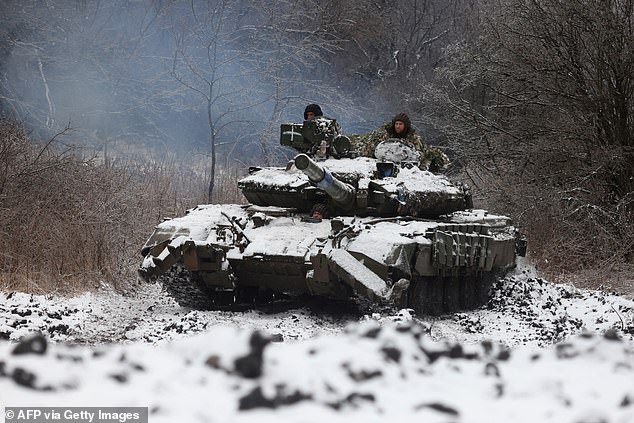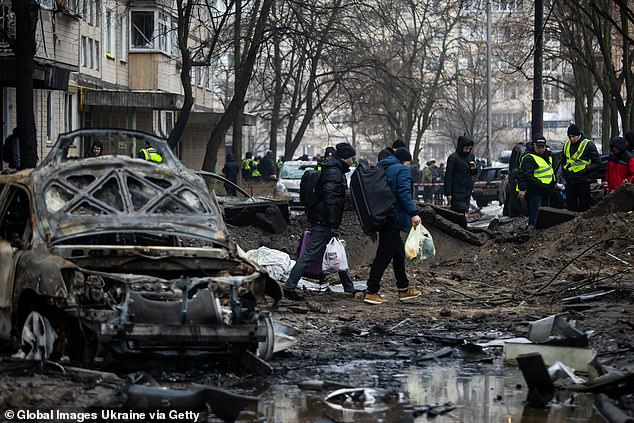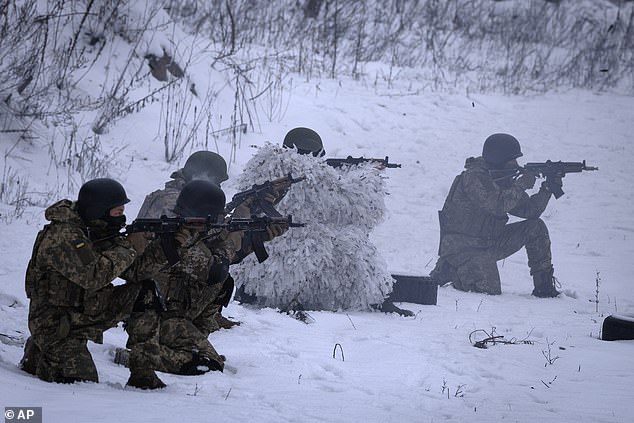Cocky Putin holds annual marathon press conference after cancelling last year as his Ukraine invasion faltered… with the swaggering Russian president confident the war is now going his way ahead of ‘election’ victory in March
Vladimir Putin will today hold his first marathon end-of-year press conference since ordering the invasion of Ukraine, with the maverick Russian president feeling the tide turning in his favor almost two years after the grueling conflict.
The despot will answer questions from journalists and viewers during the hour-long marathon, a week after he announced he is running in May's presidential elections, which will keep him in the Kremlin until at least 2030.
The Russian leader will “summarize the results of the year,” Kremlin spokesman Dmitry Peskov said, telling reporters: “It will be a combined format of the Direct Line and the president's final press conference.”
Direct Line is a carefully choreographed call-in television show that Putin has hosted every year since 2001, with a few exceptions.
But the event was canceled last year due to a troubled operation in Ukraine in which Kiev took back parts of its territory in the east and south from Russia.
Vladimir Putin will today hold his first marathon end-of-year press conference since ordering the invasion of Ukraine, with the stubborn Russian president (seen on Tuesday) feeling the tide turning in his favor almost two years after the grueling conflict
Ukraine's strong resistance and support from its allies surprised observers around the world and in Moscow, where many had expected to capture Kiev within days.
But almost two years after his offensive, Putin may sense that his fortunes are reviving and that the balance could be tipping in Russia's favor.
Ukraine's latest counter-offensive has failed to break heavily entrenched Russian lines, and support from its allies is eroding. Neither side has been able to make significant gains on the battlefield recently, a situation that suits Putin for the time being.
Meanwhile, Russia has managed to gain the support of its own allies.
While Ukraine's European and North American allies have strongly condemned Russia and imposed sanctions, others – such as China – have supported Moscow.
Other powerful countries, such as India, have avoided criticizing Russia for its actions in Ukraine.
During a visit to Washington this week, Ukrainian President Volodymyr Zelensky failed to overcome Republican opposition in Congress to the passage of a new $60 billion aid package.
And the Russian economy has weathered Western sanctions aimed at isolating Russia – although the economy's long-term resilience remains uncertain.
Moscow is still able to continue its war effort through the sale of oil, which Putin spoke about this month during a trip to the UAE and Saudi Arabia, where he was received with full honors.
In any case, Putin's election campaign, which he launched last week, is unlikely to be forced to address the real economic and human costs of the offensive.
Putin has sharply limited his interactions with foreign media since the fighting in Ukraine began, but international journalists were invited this year.
At Thursday's event, he is expected to discuss domestic issues and international politics, repeating his usual rhetoric distorting Ukraine's past.
Russian callers have already sent more than 1.5 million requests, and Russian state news agencies reported that most of the call-in queries concern the conflict in Ukraine, housing and public services.
Putin will also set out his ambitions for the March 17 elections, which could see him extend his decades-long grip on power into the 2030s.
There is little doubt about the outcome as most of the opposition is in exile or behind bars. Putin's most prominent rival, Alexei Navalny, is currently serving a 19-year prison sentence on political charges.
And the Kremlin has intensified its crackdown on dissent since the attack on Ukraine. Thousands of people have been detained and imprisoned over protests, and many thousands more have fled the country for fear of being called to fight.

Two years after his offensive, Putin may sense that his fortunes in Ukraine are reviving, and that the balance could be tipping in Russia's favor. In photo: Ukrainian soldiers drive a tank in a position near the city of Bakhmut, Donetsk region, on December 13, 2023
However, Russia is still wounded by the conflict, with Moscow's armies suffering heavy losses and its economy creaking under the pressure of sanctions.
According to US intelligence, Putin has lost almost 90 percent of his pre-invasion army, with 315,000 men killed or wounded since the war began.
A declassified US intelligence report assesses that Moscow's losses of personnel and armored vehicles to the Ukrainian army have delayed Russia's military modernization by 18 years, a source familiar with the intelligence said on Tuesday.
Russia has also lost nearly two-thirds of its tank force, or 2,200 of its pre-invasion 3,500 troops, the congressional source said.
While it is well known that Putin's forces have suffered massive losses in Ukraine, the assessment sheds new light on the extent of those setbacks.
Many assumed that Russia would assume that its much larger army would achieve victory in Ukraine within days, overthrow the government in Kiev and install a new government.
Instead, after reaching the outskirts of Kiev in the first month of the war, Russian forces were pushed back east and suffered setback after setback.
Now they find themselves in a grueling war being fought across a front line stretching hundreds of miles against a determined Ukraine that has exposed weaknesses in the Russian military once considered one of the strongest in the world.
However, analysts say the situation is currently favorable for Russia, as Moscow's armies control about 20 percent of Ukrainian territory.
Russia is expected to be able to replenish its armed forces with new conscripts and produce weapons faster than the West can supply them to Ukraine.
But Putin's press conference also comes after it was revealed that his country's economy has taken a hit since the start of the conflict.
The war has pushed up domestic prices and forced Moscow to spend a third of its budget on defense, the British Financial Times newspaper reported on Thursday, citing a draft text from the US Treasury Department.
Russia's economy would have grown by more than 5 percent if Putin had not started the war in Ukraine, the newspaper said, citing Rachel Lyngaas, the department's chief sanctions economist.
Lyngaas added that the country performed worse than other energy exporters, including the United States.

People with bags walk past a damaged apartment building in the Ukrainian capital Kiev after a Russian missile attack on December 13
The US Treasury Department did not respond to a request for comment from Reuters news agency.
According to the FT report, Moscow spent more than $100 billion in 2023, or almost a third of its total defense spending.
The backbone of the Russian economy – oil and gas revenues – took a hit this year, although there has been a slight recovery in recent months as oil prices firmed.
Moreover, Western sanctions on Russia's oil trade have not had as big an impact as initially predicted.
As Putin speaks on Thursday, EU leaders will try to agree on a major aid package and begin accession negotiations for Ukraine.
However, Hungarian Prime Minister Viktor Orbán has threatened to veto the measure.
Kiev is desperately trying to improve the story after Zelensky failed to win over Republican lawmakers in Washington.
But Orban — Russia's closest ally in the European Union — is standing in the way of Ukraine's hopes for 50 billion euros in financial aid and progress toward his goal of one day joining the bloc.
Critics have accused Orban of holding Kiev's chances of survival hostage in a bid to force Brussels to release billions of euros in EU funds frozen over a rule of law dispute.
In what some saw as a last-minute concession, the European Commission, the EU's executive arm, agreed on Wednesday to unblock 10 billion euros of that money.
But 21 billion euros is still beyond Orbán's reach and it was far from clear that this gesture would prevent a damaging dispute at the summit.

Members of the pro-Ukrainian Russian ethnic Siberian battalion exercise during a military training near Kiev, Ukraine, Wednesday, December 13
The right-wing veteran warned that opening accession negotiations with Ukraine would be a “terrible mistake” and that he would not relent.
Zelenskiy countered that Orbán had “no reason” to stop Kiev from moving towards EU membership and said his country could not defeat Russia without more support.
It comes after Russia fired a new wave of missiles into Kiev on Wednesday, wounding dozens of people in the most damaging attack on the capital in months.
Another attack early Thursday injured another 11 people in the southern Odesa region, emergency services said.
